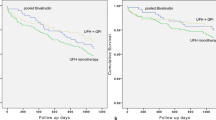Summary.
Aims: We analyzed whether using Eptifibatide plus heparin compared to heparin alone in patients with acute coronary ischemic syndromes is cost saving and/or cost-effective from the perspective of German hospitals. Our analysis is based on the clinical results of the PURSUIT study. Materials and methods: We conducted an incremental cost-consequence and cost-effectiveness analysis from the perspective of the admitting hospital. Costs refer to the initial hospitalization following the event. Incremental drug costs are based on a 72 hour infusion of Eptifibatide. Additional costs are analyzed as resulting from the management of complicating myocardial infarctions, including incremental days on the general ward or intensive care unit as well as necessary revascularization procedures. All costs are expressed in EURO (EUR). The estimated costs of managing ischemic complications are based on typical patterns seen in German hospitals. Our estimation of the life-years saved by using Eptifibatide is based on the DEALE method. All calculations are standardized to a hypothetical cohort of 100 treated patients. Results: There are 0.064 saved life-years per patient. Cost-effectiveness of Eptifibatide is EUR 14,464 per life-year saved. Conclusion: Eptifibatide is cost-effective compared to other therapies in the treatment of acute coronary ischemic syndromes. The additional costs of using this substance should be reimbursed to the hospitals.
Zusammenfassung.
Zielsetzung: Die folgende Analyse untersucht, ob eine primäre Glykoprotein IIb/IIIa-Therapie mit Eptifibatid und Heparin, verglichen mit einer alleinigen Heparintherapie, bei Patienten mit akutem Koronarsyndrom aus der Sicht des Krankenhauses wirtschaftlich ist. Diese Wirtschaftlichkeitsanalyse wird auf der Grundlage der klinischen Ergebnisse der PURSUIT-Studie durchgeführt. Material und Methoden: Wir führten eine inkrementale Kosten-Konsequenz- sowie eine Kosteneffektivitäts-Studie mit Bezug auf die Primärhospitalisation durch. Die Kosten umfassen die Medikationskosten sowie die Kosten, die aus der Hospitalisationsdauer und aus Revaskularisationsmaßnahmen resultieren. Die inkrementalen Medikationskosten basieren auf einer 72-stündigen Infusion von Eptifibatid. Die Kosten der Behandlung von Komplikationen (Re-Infarkten) wurden anhand einer Analyse typischer Verlaufsmuster an fünf deutschen Kliniken bestimmt. Die durch eine Eptifibatid-Therapie gewonnenen Lebensjahre wurden mittels des DEALE-Verfahrens geschätzt. Alle Berechnungen beruhen auf einer hypothetischen Kohorte von 100 Patienten. Ergebnisse: Die geretteten Lebensjahre betragen 0,064 pro Patient. Die Netto-Investitionen der Krankenhäuser durch die Therapie mit Eptifibatid betragen EUR 932 pro Patient. In dieses Resultat fließt eine Reduktion der Ausgaben für die Re-Infarktbehandlung um EUR 62 pro Patient ein. Die daraus abgeleitete Kosteneffektivität beträgt EUR14464 pro gerettetem Lebensjahr. Schlussfolgerung: Die vorliegenden Ergebnisse zeigen, dass eine primäre Eptifibatid-Therapie von Patienten mit akutem Koronarsyndrom im Vergleich zu anderen Therapien kosteneffektiv ist. Die Vergütungsstrukturen sollten daher so gestaltet werden, dass den Krankenhäusern durch die Anwendung dieser Substanz keine finanziellen Nachteile entstehen.
Similar content being viewed by others
Author information
Authors and Affiliations
Additional information
Eingegangen: 2. August 2002 Akzeptiert: 25. November 2002
Correspondence to Thomas D. Szucs
Rights and permissions
About this article
Cite this article
Szucs, T., Schwenkglenks, M., Berger, K. et al. Kosten und Kosteneffektivität von Eptifibatid in der Behandlung des akuten Koronarsyndroms . Z Kardiol 92, 236–244 (2003). https://doi.org/10.1007/s00392-003-0908-5
Issue Date:
DOI: https://doi.org/10.1007/s00392-003-0908-5




